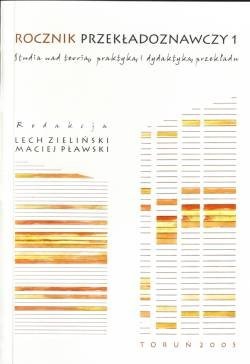Tłumaczenie a interpretacja. O nadwyżkach treści w tekście docelowym
DOI:
https://doi.org/10.12775/RP.2005.001Słowa kluczowe
supernumerary element in translation, translation and interpretation, literary translationAbstrakt
The paper defines content excess as a supernumerary element of the target text which is supposed to have an implicit equivalent in the source text. The content excess is different from those additional elements in the target text which accompany searching for adequacy, i.e. represent implicit elements in the source text that have to be translated explicitly due to linguistic or cultural reasons. On the other hand, the content excess in the target text has to be differentiated from an addition that (through its size or relevance) deliberately alters the translated text into an adaptation or a different version. This definition of the content excess must be perceived as a result of subjective text interpretation. The analysis of two Polish translations of Gottfried Benn’s late poem Apreslude provides a detailed example of a translation approach which, as the conclusion suggests, should rather be avoided, particularly in literary translation where the interpretive openness is one of the primary text values.
Bibliografia
Benn, G., 1982, Poezje wybrane, tł. Krzysztof Karasek, Warszawa.
Benn, G., 1987, „Aprèslude”, przeł. L. Barańska, [w:] E. Ringel, Gdy życie traci sens. Rozważania o samobójstwie, przeł. E. Kaźmierczak, Szczecin, s. 219.
Benn, G., 1988, Gedichte in der Fassung der Erstdrücke, Frankfurt/M.
Burzyńska, A., 2003, „Teoria i lektura: niebezpieczne związki”, Pamiętnik Literacki, XCIV, z. 1, s. 71–109.
Camus, A., 1985, Obcy, tł. M. Zenowicz, Warszawa.
Carroll, L., 1975, Przygody Alicji w Krainie Czarów/O tym, co Alicja odkryła po drugiej stronie lustra, tł. M. Słomczyński, Warszawa.
Carroll, L., 1990, Alice’s Adventures in Wonderland/Przygody Alicji w Krainie Czarów, tł. R. Stiller, Warszawa.
Carroll, L., 1999, Alicja w Krainie Czarów, tł. J. Kozak, Warszawa.
Dąmbska-Prokop, U. (red.), 2000, Mała encyklopedia przekładoznawstwa, Częstochowa.
Delisle, J., Lee-Jahnke, H., Cormier, M. C. (red.), 2004, Terminologia tłumaczenia, tł. T. Tomaszkiewicz, Poznań.
Eco, U., 1994, Lector in fabula. Współdziałanie w interpretacji tekstów narracyjnych, przeł. P. Salwa, Warszawa.
Freud, S., 1972, Das Unbehagen in der Kultur/Abriß der Psychoanalyse, Frankfurt/M.
Freud, S., 1995, Kultura jako źródło cierpień, tł. J. Prokopiuk, Warszawa.
Hejwowski, K., 2004, Kognitywno-komunikacyjna teoria przekładu, Warszawa.
Koller, W., 1972, Grundprobleme der Übersetzungstheorie, Bern–München.
Leuven-Zwart, K. M. van, 1989, „Translation and Original. Similiarities and Dissimiliarities, I”, Target 1: 2, s. 151–181.
Leuven-Zwart, K. M. van, 1990, „Translation and Original. Similiarities and Dissimiliarities, II”, Target 2: 1, s. 69–95.
Lukszyn, J.(red.), 1993, Tezaurus terminologii translatorycznej, Warszawa.
Mickiewicz, A., 1983, Wiersze (=Dzieła poetyckie I ), Warszawa.
Prejbisz, A., Jasińska, B., Kryński, St., 1984, Gramatyka angielska w ćwiczeniach, Warszawa.
Reszke, R., 1995, „Nota redakcyjna”, [w:] S. Freud, 1995, Kultura jako źródło cierpień, tł. J. Prokopiuk, Warszawa, s. 160.
Ringel, E., 1987, Gdy życie traci sens. Rozważania o samobójstwie, przeł. E. Kaźmierczak, Szczecin.
Schiller, F., 1981a, Gedichte. Prosaschrien (=Werke in fünf Bänden 1), Berlin-Weimar.
Schiller, F., 1981b, Die Räuber/Die Verschwörung des Fiesko zu genua/Kabale und Liebe (=Werke in fünf Bänden 2), Berlin–Weimar.
Schneider, M., 1993, Übersetzung und Bearbeitung: zur Differenzierung und Abgrenzung des Übersetzungsbegriffs, Tübingen.
Snell-Hornby, M., Hönig, H. G., Kußmaul, P., Schmitt, P. A. (red.), 21999, Handbuch Translation, Tübingen.
Tabakowska, E., 2001, Językoznawstwo kognitywne a poetyka przekładu, Kraków.
Zima, P. V., 1992, Komparatistik. Einführung in die Vergleichende Literaturwissenscha, Tübingen.
Pobrania
Opublikowane
Numer
Dział
Statystyki
Liczba wyświetleń i pobrań: 704
Liczba cytowań: 0



